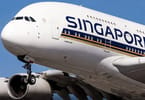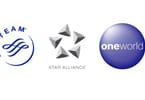A battle is being waged in the skies between Boston and Baltimore.
The three major US low-cost airlines are all now offering nonstop flights from Logan International Airport to Baltimore-Washington International Thurgood Marshall Airport – the biggest route in the country in which Southwest Airlines, JetBlue Airways, and AirTran Airways all fly head to head. The fierce rivalry is a boon for passengers, giving them more amenities to choose from – Wi-Fi or seat back TVs? Two free checked bags or more legroom? – and pushing prices as low as $19 each way.
The Boston-Baltimore competition reflects the growth and aggressiveness of the low-fare carriers, which are entering new markets at a time when overall air travel is down 21 percent from a year ago, according to the Air Transport Association. Before, the low-cost airlines would go into markets to undercut the big legacy carriers, but now they’re increasingly forced to compete with each other. The battle these airlines are engaged in might be a losing one. Baltimore is the 10th most popular destination out of Boston, generating 460,000 passengers a year, but airline analysts say the market might not be big enough for all three low-cost carriers.
“This is like executive chefs fighting over a can of spam,’’ said aviation consultant Mike Boyd.
So why the big fuss over spam? Space, for one thing. The three carriers are already in or eyeing interna tional markets such as Mexico, Canada, and the Caribbean, but the tight race for the Boston-Baltimore route shows that there isn’t an unlimited number of untapped US markets for the low-cost carriers to enter.
JetBlue, AirTran, and Southwest all made money in the second quarter – a relative rarity in the airline industry, which lost $55.4 billion between 2001 and 2008, according to the air transport group – and JetBlue and AirTran are the only two airlines with more capacity than they had two years ago. The low-cost carriers are also going after bigger markets and taking passengers away from the legacy airlines. Delta, the only legacy carrier that had been flying the Boston-Baltimore route in the past year, left the market before the competition heated up.
“The airlines are recognizing that most of the ripest fruit has been picked from the tree,’’ said Henry Harteveldt, principal airline analyst for Forrester Research. As to whether there will be similar competition across the country? “I think everyone’s going to watch to see how Boston to Baltimore plays out.’’
Baltimore and Boston are also vital cities to all three carriers, which all compete on only two other routes, Orlando to Dulles and Orlando to Buffalo. Southwest and AirTran are the top two airlines at the Baltimore airport, carrying 51 and 15 percent of the passengers, respectively, and AirTran is the fastest-growing airline there. At Logan, JetBlue has the most destinations and AirTran has been growing steadily.
Additionally, the Baltimore airport serves as a gateway city for Southwest and AirTran, allowing passengers to make connections to lots of other destinations. It “opens up a large chunk of our system,’’ said Paul Flaningan, a spokesman for Southwest, which has 38 nonstop connections from Baltimore to AirTran’s 19. JetBlue just entered the Baltimore market, and has only one connection – to Boston – a response to customer demand, according to Marty St. George, senior vice president of marketing and commercial strategy for JetBlue.
The route is a popular one among business travelers. Baltimore, whose airline code BWI is often called “bee-wee’’ in the industry – is 25 miles from Washington, D.C., about the same distance from the capital as Dulles International Airport. Reagan National Airport is closer to downtown D.C., but fares are 30 percent higher than at the Baltimore airport, according to the Bureau of Transportation Statistics. Fares into Dulles are 34 percent higher.
Along the Boston-Baltimore route, round-trip prices between the two cities are $50 lower on average than they were before Southwest and JetBlue entered the market, according to FareCompare.com. All three airlines are now offering a $39 one-way Boston-Baltimore fare.
When the fares are identical, the difference is in the details. During four 90-minute flights on three different airlines between the two cities last week, those details were critical. JetBlue has leather seats, more legroom, and seat back TVs for everyone. AirTran offers Wi-Fi – free until the end of the month, then $5.95 per flight – and has separate business class seating with free drinks, wider leather seats, more legroom, and priority boarding. Southwest doesn’t charge for the first two checked bags and doesn’t charge a fee to change flights; the airline is also known for its banter, but only one joke was cracked during an early afternoon flight: “We have to stop for gas and directions,’’ the pilot announced of the layover in Baltimore.
Some passengers flying the Boston-Baltimore route said they chose their airline solely on price. Myra Rosen of Clarksburg, Md., who packed a carry-on bag full of lead crystal to take to her pregnant daughter, snagged tickets on JetBlue the day of the $19 one-way sale. She doesn’t care which airline she’s on – “as long as they land,’’ she said.
Even some business travelers whose companies foot the bill pay attention to prices these days. Peter Roy of Somerville, vice president of construction and design for a real estate developer, has been flying to Baltimore on AirTran every week for the past six months and tried out the two new competitors on his most recent trip. “I’m going to go with whatever’s cheapest.’’
Other passengers made their decision based on amenities. Eric Benovitz, president of a souvenir company who was headed to Boston to see a customer, was comparing AirTran and Southwest fares on his laptop in the BWI terminal. He was happy about the new lower prices, but it was AirTran’s wireless Internet access that won him over. “For $5.95, I can get another hour of productivity,’’ he said.
هن آرٽيڪل مان ڇا وٺو:
- The three carriers are already in or eyeing interna tional markets such as Mexico, Canada, and the Caribbean, but the tight race for the Boston-Baltimore route shows that there isn't an unlimited number of untapped US markets for the low-cost carriers to enter.
- The Boston-Baltimore competition reflects the growth and aggressiveness of the low-fare carriers, which are entering new markets at a time when overall air travel is down 21 percent from a year ago, according to the Air Transport Association.
- Southwest and AirTran are the top two airlines at the Baltimore airport, carrying 51 and 15 percent of the passengers, respectively, and AirTran is the fastest-growing airline there.






















